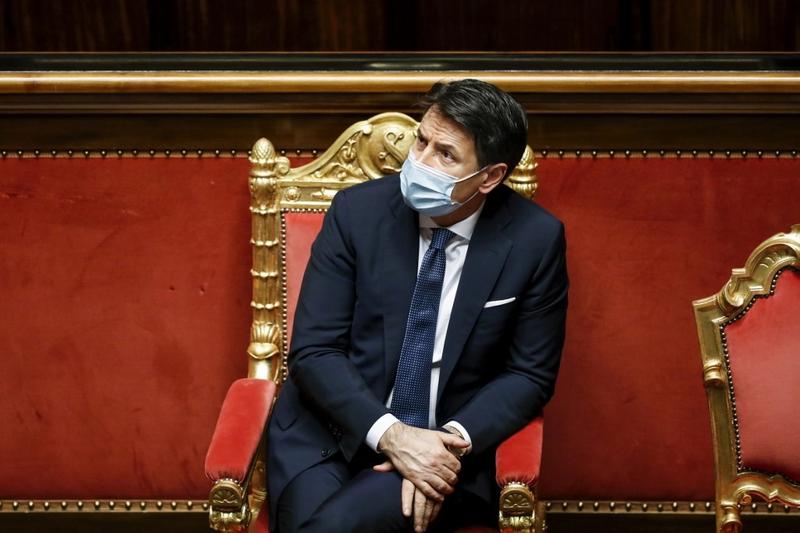 Italian Prime Minister Giuseppe Conte attends a debate ahead of a confidence vote at the Senate on Jan 19, 2021 at Palazzo Madama in Rome. (YARA NARDI / POOL / AFP)
Italian Prime Minister Giuseppe Conte attends a debate ahead of a confidence vote at the Senate on Jan 19, 2021 at Palazzo Madama in Rome. (YARA NARDI / POOL / AFP)
ROME - Italian Prime Minister Giuseppe Conte narrowly won a confidence vote in the upper house Senate on Tuesday, allowing him to remain in office after a junior partner quit his coalition last week in the midst of the raging COVID-19 pandemic.
However, Conte failed to secure an absolute majority, meaning he now heads a minority government that will struggle to implement its policy programme at a time of severe national emergency.
Having overcome a similar confidence motion in the lower house on Monday, Conte won in the 321-seat Senate by 156 to 140, with 16 abstentions
Having overcome a similar confidence motion in the lower house on Monday, Conte won in the 321-seat Senate by 156 to 140, with 16 abstentions.
Looking to head off speculation he might resign following the close vote, Conte said he would seek to bolster his support in parliament. In the meantime, he promised to focus on tackling the country’s twin health and economic crises.
READ MORE: Italy's Conte seeking stray senators to save struggling coalition
“Italy doesn’t have a minute to lose,” he said on Twitter.
The small Italia Viva party, headed by former prime minister Matteo Renzi, abandoned the cabinet in a row over Conte’s handling of the coronavirus pandemic and subsequent recession. It abstained on Tuesday, leaving the door open for a possible return to the coalition if its policy demands are met.
Conte and his main partners, the 5-Star Movement and the centre-left Democratic Party (PD), appeared unwilling to kiss and make up.
Addressing the Italia Viva senators, Conte said, “You have chosen the path of aggression and media attacks... this is not the best choice for the interests of the country.”
The small Italia Viva party, headed by former prime minister Matteo Renzi, abandoned the cabinet in a row over Conte’s handling of the coronavirus pandemic
Hoping to entice centrist and liberal lawmakers currently outside the coalition, Conte has promised to revamp his policy agenda and shake up his cabinet, saying he wants to modernise Italy and speed up implementation of an economic recovery plan.
In the event, only two members of the opposition centre-right Forza Italia party switched sides on Tuesday, while a number of unaligned politicians who had come under heavy pressure to help the government ended up voting against Conte.
Italy has had several minority governments in recent times, but history has shown they are highly vulnerable to ambush in parliament and risk collapse at any divisive vote.
ALSO READ: Italy PM Conte looks to cling to power in crucial Senate vote
“There will be lots of drama and it will be hard to get anything done,” said Giovanni Orsina, head of LUISS university’s school of government in Rome.
He predicted the government would collapse in the summer, when a six-month moratorium on national elections kicks in ahead of the end of President Sergio Mattarella’s seven-year mandate.
Analysts say many lawmakers want to avoid an early ballot, fearing they will not be re-elected next time around. As a result, some of them played it safe this week and helped Conte stay in office. But as soon as the moratorium kicks in, removing any threat of a vote, they would move to oust Conte and try to form a new administration, Orsina said.


